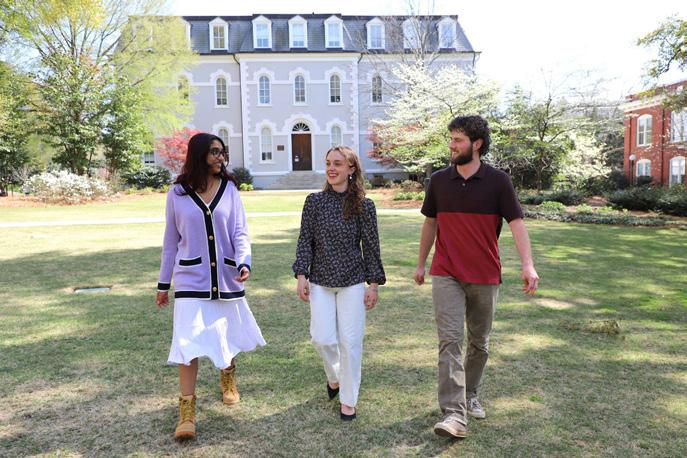
UGA students earn some of the nation’s highest academic honors. Read more on Page 2.


UGA students earn some of the nation’s highest academic honors. Read more on Page 2.

By Elizabeth Elmore eelmore@uga.edu
More than 72,460 University of Georgia supporters contributed a record $300.4 million to the university during the fiscal year that ended June 30 (FY25). This is the first time university fundraising has surpassed $300 million.
Gifts were directed to enhance key university initiatives, including student scholarships, faculty and graduate student support and the university’s new School of Medicine.
During the 2024-2025 academic year, privately funded scholarships supported more than 9,500 students,
and during FY25, donors helped to reach 391 total endowed chairs and professorships. Donors included alumni, students, parents, UGA employees and retirees, corporate and private foundations and other members of the community.
“As we continue to innovate and make progress on important initiatives at the University of Georgia, I am incredibly grateful to our donors for all they do to fuel our ongoing pursuit of excellence,” said President Jere W. Morehead. “I am energized by our loyal alumni and friends and their ongoing confidence in our mission, and I look forward to all that we will
accomplish together in the years ahead.”
This past year’s unprecedented level of private support continues a trend of elevated giving that has driven the three-year rolling average to $272.8 million, the highest ever achieved by the state’s flagship university. It also marks the third time in UGA history that total fundraising was more than $250 million.
“The university community has stepped up like never before,” said Jill S. Walton, vice president for development and alumni relations and executive director of the UGA Foundation. “As we celebrate
By Rebecca Vander Plaats rebeccavp@uga.edu
Auxiliary Services has made en hancements to services throughout campus to help make the 2025-2026 academic year the best yet for stu dents, faculty, staff and visitors at the University of Georgia.
Over 1,800 new parking spaces have been added to campus, while passengers will see new bus routes and route names as well as increased service to park-and-ride lots.
Diners on campus will enjoy increased variety and greater conve nience thanks to expanded franchise partnerships across campus and an autonomous market at the Tate Student Center.
The UGA Bookstore received a full makeover this summer, which has updated its look and made
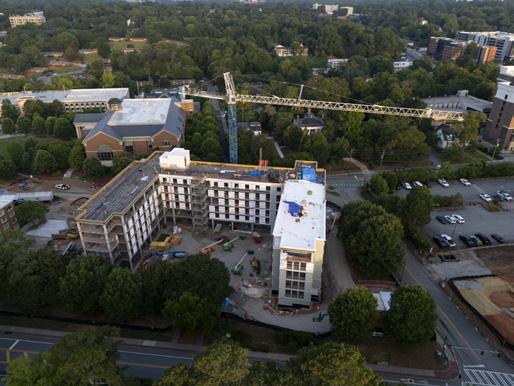
In February 2024, the Board of Regents of the University System of Georgia authorized the University of Georgia to establish a new School of Medicine — and UGA has moved quickly to turn that vision into reality, accelerating the launch of a school that will play a vital role in addressing the state’s health care needs.
In mid-September, a team from the accrediting body for medical schools, the Liaison Committee on Medical Education, will conduct a site visit. This critical step in the approval process comes after the LCME granted the School of Medicine candidate status in February of this year, recognizing the significant progress UGA has made toward meeting its rigorous standards for full accreditation.
When the LCME team arrives,
Several new administrators and deans have been named at the Uni versity of Georgia in the last year, including the following:
Benjamin C. Ayers
Benjamin C. Ayers has been named the University of Georgia’s senior vice president for academic affairs and provost.
Ayers, who holds the Earl Davis Chair in Taxation, served as dean of the C. Herman and Mary Virginia Terry College of Business since 2014. He became UGA’s chief academic officer on June 30 and succeeded S. Jack Hu, who was appointed chancellor of the University of California, Riverside.
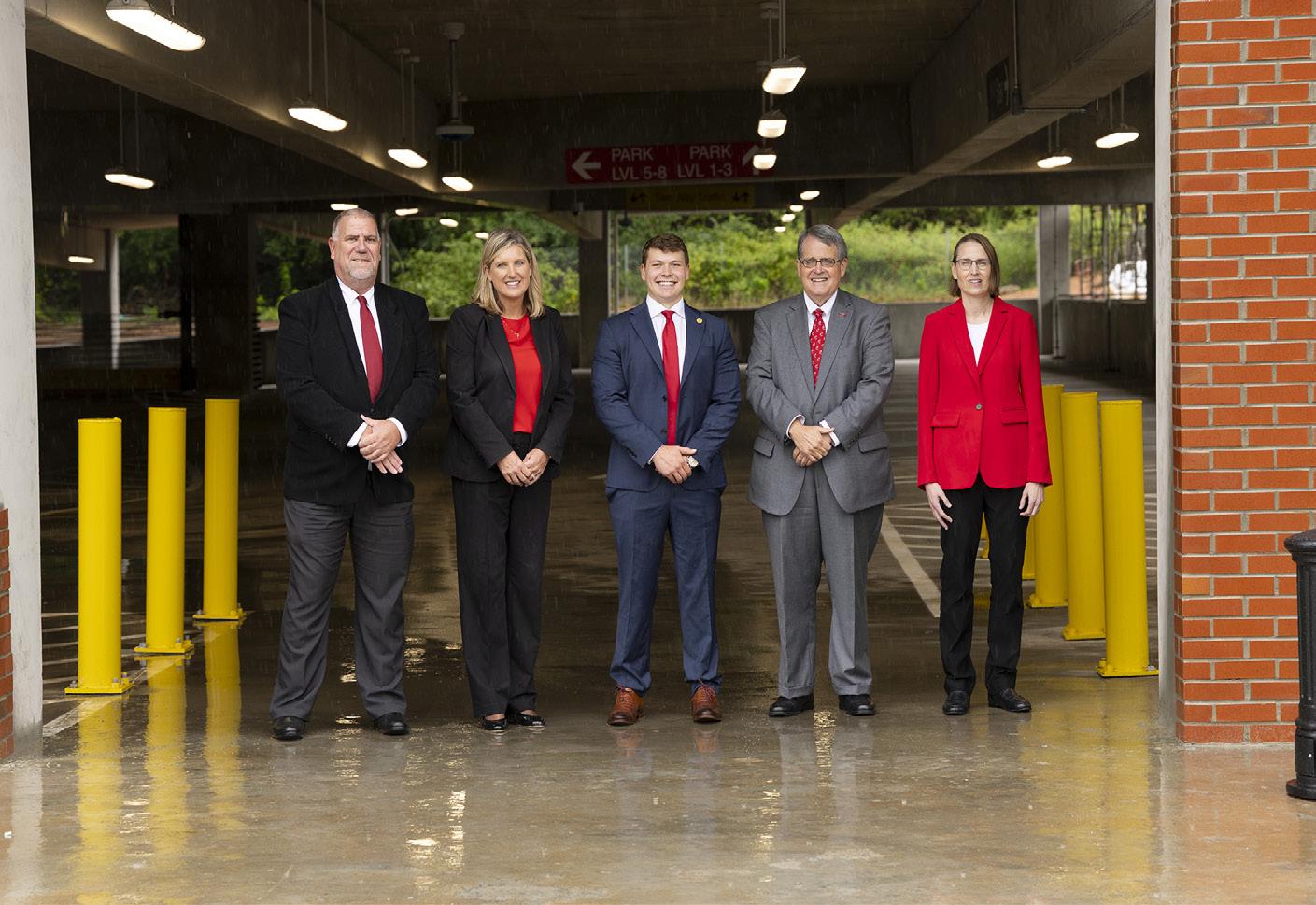
they will see construction of the new Medical Education and Research Building well underway.
The 93,600-square-foot facility will house state-of-the-art research laboratories, a simulation and clinical skills center, an anatomy lab, active-learning classrooms, student support areas and a dedicated medical library. The $100-million building has been fully funded through a match of state and private funds.
Dr. Shelley Nuss, dean of the School of Medicine, continues to build out the school’s faculty and leadership team. A key hire was made last fall when Dr. Erica Brownfield was appointed senior associate dean for academic affairs. Formerly the associate dean of medical education at Emory University, Brownfield oversees
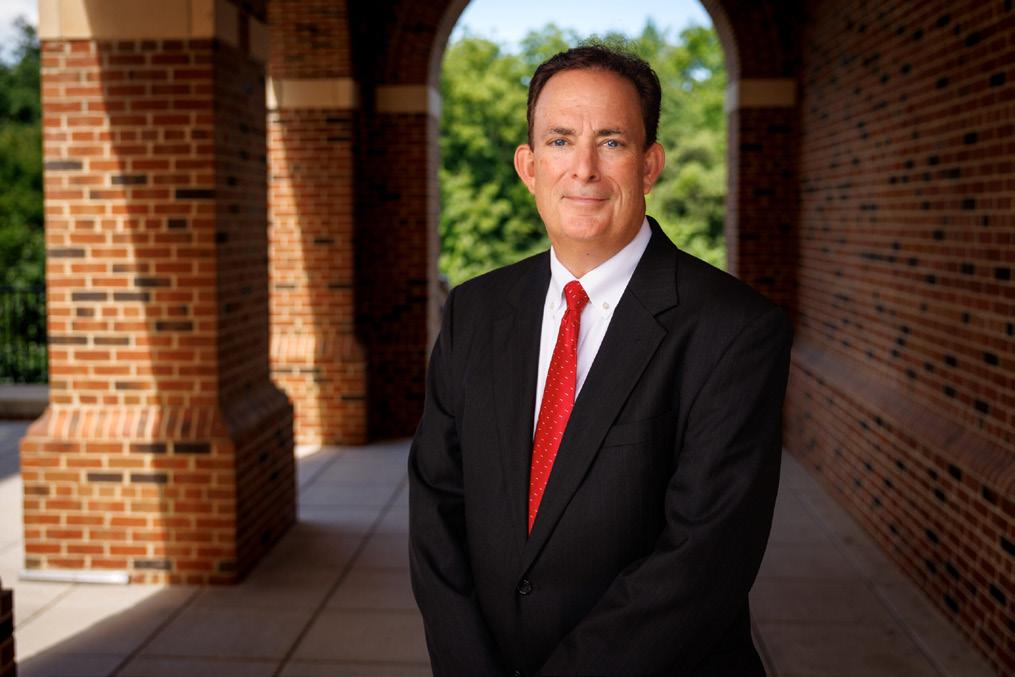
Under Ayers’ leadership, the
By Heather Skyler heatherskyler@uga.edu
In today’s fast-changing workforce, employers are looking beyond grades and résumés to find candidates who can think critically, lead teams and solve complex problems. Now, the University of Georgia is giving students a new way to showcase exactly those skills.
This fall, UGA will officially launch its Comprehensive Learner Record — an innovative digital credential designed to capture a student’s full range of learning experiences, from academic courses to leadership
Terry College has achieved cess, endowing four academic units while launching a petitive online ter’s in business
tive and dual degree programs, and market-driven certificates. Over the past decade, the college’s undergraduate enrollment has grown by 40%, graduate enrollment has risen 64%, and the college has achieved
roles and hands-on projects.
Unlike a transcript, the CLR presents a holistic, validated record of the skills that matter most in the modern job market — skills such as analytical thinking, communication, leadership and creativity.
“Students at the University of Georgia are already building important skills through their classes and activities. By helping students recognize and articulate what they’ve learned, we’re not just enriching their education — we’re giving them a powerful advantage in the job market. This credential helps them tell a
It’s been a banner year for some of UGA’s most inspiring students. From solving real-world challenges in science labs to shaping public policy, these Bulldogs are earning top national honors and proving that the future is in very good hands.
Behind every prestigious honor is a story of hard work, late nights, and the kind of mentorship that makes a difference. At UGA, students don’t chase these dreams alone—they’re backed by faculty, staff and programs that help lead them every step of the way.
Through the Jere W. Morehead Honors College, which houses UGA’s Major Scholarships Office, students receive guidance and encouragement as they navigate the rigorous application processes for national scholarships. Faculty and staff work closely with students to help them refine their goals, polish their applications, and prepare for interviews, opening doors to some of the world’s most competitive academic and leadership opportunities.
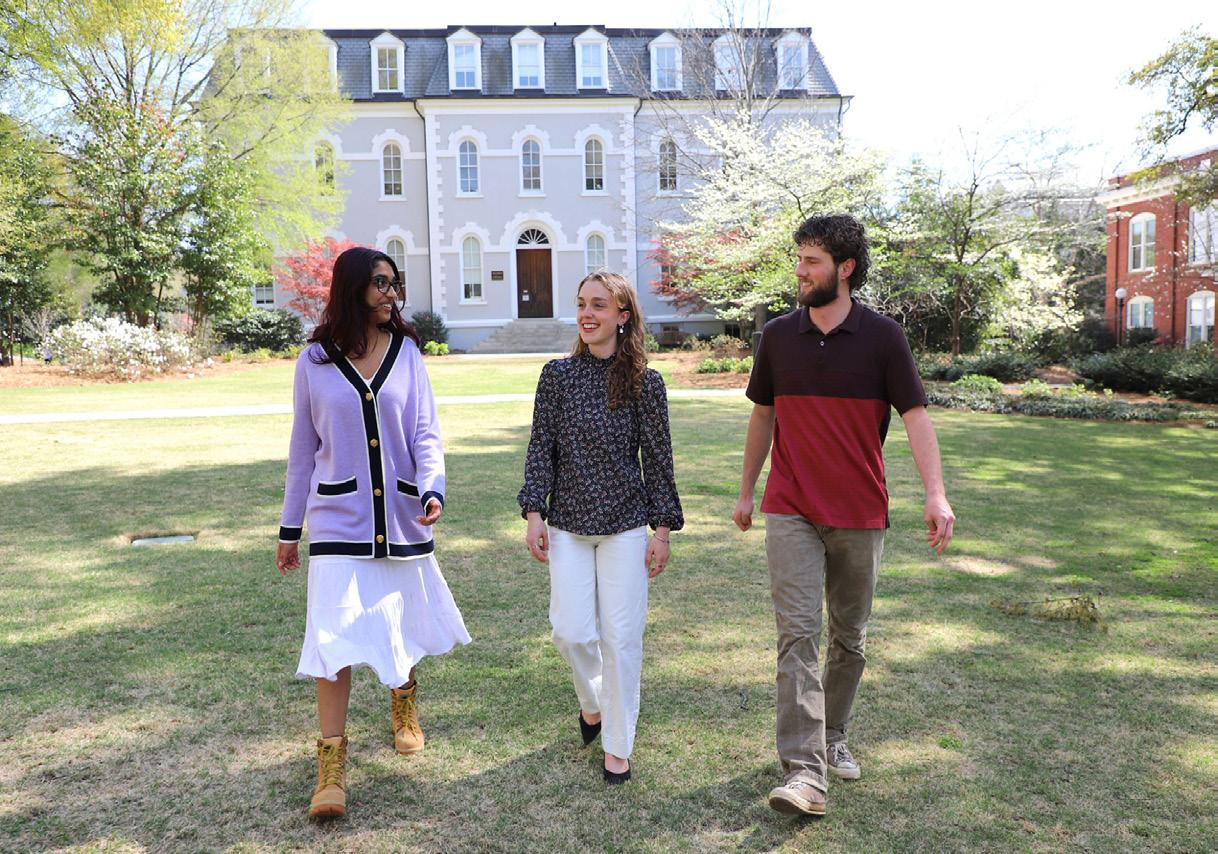
“Across our institution, we are committed to helping our students thrive, whether they are debating international challenges in the classroom, working with DNA in the lab, or checking on turtle populations in the field,” said Meg Amstutz, dean of the Morehead Honors College. “From faculty to staff to community mentors, our students are succeeding because of the strong support they receive.”
A future leader
Mercedes Bengs is charting a path that honors her family’s legacy of service. The University of Georgia senior is preparing to become a fourth-generation military service member, following in the footsteps of her father, a retired Air Force lieutenant colonel.
Until then, she’s preparing herself to become an expert in areas of foreign policy and national security. Bengs was one of 54 undergraduates selected as a 2025 Truman Scholar, awarded each year to students who demonstrate academic excellence, leadership potential and commitment to a career in government or the nonprofit sector.
Bengs studies international affairs in the School of Public and International Affairs and Russian in the Franklin College of Arts and Sciences. She is a cadet in UGA’s Air Force ROTC, is in the Russian Flagship Program, and is a Russell Security Leadership Program Fellow.
A global focus
UGA set a record with three Schwarzman Scholars in a single year for 2025 when the Schwarzman Scholars program announced its 10th class of recipients.
The honorees are Foundation Fellows Aryan Thakur, who graduated with bachelor’s degrees in genetics and mathematics from the Franklin College; and Amanda Whylie, who earned a bachelor’s degree in entertainment and media studies from
the Grady College of Journalism and Mass Communication and a minor in Spanish in the Franklin College; and Garrett Williams, a Ramsey Honors Scholar who graduated from UGA in 2022 with bachelor’s degrees in economics and finance with a certificate in personal and organizational leadership from the Terry College of Business and a minor in communication studies from the Franklin College. The Schwarzman enables them to pursue a one-year master’s degree in global affairs at Tsinghua University in Beijing, China, starting this August.
Schwarzman Scholars are taught by leading international faculty, and they study a core curriculum focused on leadership, global affairs, and China, helping them learn to navigate the complexities of an evolving global landscape.
Eleven UGA students or alumni have been named Schwarzman Scholars since the program launched in 2015.
Making a difference locally and abroad
Seventeen students — each with their own story, passion, and sense of purpose — were selected for Fulbright awards for the 2024-2025 academic year, placing UGA among the nation’s top producers of Fulbright U.S. students.
Of the 17 UGA students and recent alumni who were offered Fulbright awards for 2024-2025, 13 were able to accept. Eight are teaching English in countries including Indonesia, Kazakhstan, Romania, Spain and Taiwan. Five are studying or conducting research; their countries are Brazil, Colombia, Madagascar, Taiwan and Tunisia.
Science and innovation
Juniors Oscar de la Torre, Anderson Smith and Sloka Sudhin are among the 441 undergraduates from across the nation to be recognized as Barry Goldwater Scholars this
spring. Whether it’s protecting endangered species or solving real-world equations, they are turning curiosity into impact.
Since 1995, 70 students at the University of Georgia have received the Goldwater Scholarship, which recognizes exceptional sophomores and juniors across the United States.
Building tomorrow’s problem-solvers
A scientist and storyteller in training, the University of Georgia’s Yeongseo Son was selected for the 2025 KnightHennessy Scholarship, a global graduate-level program at Stanford University.
A Foundation Fellow, Son graduated in May with bachelor’s degrees in anthropology and biochemistry and molecular biology as well as a certificate in immunology, all from the Franklin College of Arts and Sciences.
UGA’s fourth Knight-Hennessy Scholar, Son will pursue a Ph.D. in immunology from the Stanford University School of Medicine and research how the immune system interacts with the environment, particularly within the lungs, to improve global respiratory health.
Environmental excellence
Michael Skibsted’s interest in turtles and wildlife conservation has earned him a 2025 Udall Scholarship, which recognizes students for leadership, public service and commitment to issues related to the environment.
Skibsted is majoring in ecology in the Odum School of Ecology and biology in the Franklin College. He also has received funding for his research from the UGA Center for Undergraduate Research Opportunities. Skibsted wants to develop creative solutions to problems in the realm of conservation biology and ecology with an emphasis on turtle populations.
Seven UGA undergraduates were selected as Boren Scholars this spring — the second highest number in the country for the second year in a row. These students will receive funding to study critical languages in Kazakhstan, Senegal and Brazil in exchange for a year of federal service.
Five recipients were awarded a Boren Scholarship to support their participation in a capstone-year program to study Russian and complete an internship in Kazakhstan as part of the Russian Flagship program. Two others were awarded Boren Scholarships to support their participation to study French in Senegal and Portuguese in Brazil.
Each of these students brings their own drive, heart, and vision for the future. Together, they reflect the spirit of UGA, a place where big dreams are encouraged, nurtured and launched into the world. As they prepare to take their talents around the globe, they carry with them the spirit of a university that continues to inspire and empower the leaders of tomorrow.
University of Georgia reflects on an academic year defined by excellence
The 2024–2025 academic year marked a period of exceptional progress at the University of Georgia, defined by bold advancements in research, academics and public service that reflect the university’s enduring commitment to excellence and impact. Across classrooms, labs and communities, UGA’s work delivered tangible results and helped chart a strong course for the future — making this a truly defining year for the institution.
“The extraordinary progress we have made at the University of Georgia is a testament to the shared vision and dedication of our entire university community,” said President Jere W. Morehead. “I am deeply grateful to our faculty, staff, students, alumni and friends for their steadfast support, and I look forward to all that we will accomplish together in the year to come.”
Excellence in action
It was a standout year for the University of Georgia. Last fall, UGA rose two spots to No. 18 in U.S. News and World Report’s 2025 ranking of the nation’s top public universities, marking the ninth consecutive year the university has ranked among the top 20. UGA currently shares the No. 18 position with Purdue University and the University of Washington, reinforcing its place among the most respected public institutions in the country.
UGA and Georgia Tech were the only two universities from the state of Georgia to make the top 20. Georgia and California
were the only two states to have more than one institution in the top 20. In addition, UGA joined elite company with this year’s ranking, as 19 of the institutions in the top 20 are members of the prestigious Association of American Universities.
This recognition from U.S. News was driven in no small part by the extraordinarily important work conducted by UGA researchers. For the first time in the university’s history, research and development expenditures rose to a record $628.1 million, a 10% increase from the previous year and the sixth consecutive year of growth.
The surge in research activity also propelled UGA back to No. 1 among U.S. universities for the number of research-based products brought to market, according to the annual AUTM survey. For 10 straight years, UGA has placed in the Top 2 and has never appeared out of the Top 5 in the 12 years the survey has been reported.
Additionally, UGA also was named among the best universities in the nation in The Princeton Review’s 2025 best colleges ranking. UGA ranked No. 12 in the nation among best value public schools, No. 14 among best value public colleges without aid, No. 16 among all schools for internships, No. 10 for financial aid and No. 8 for best alumni networks.
That momentum was matched by national recognition of UGA’s faculty, many of whom received prestigious scientific honors for their groundbreaking work and contributions to their fields.
In the spring, Gregory Robinson, University of Georgia Foundation Distinguished Professor of Chemistry, was elected to the American Academy of Arts and Sciences and professors C. Robin Buell and Daniel R. Perez were elected to the National Academy of Sciences. In addition, the National Academy of Inventors selected eight UGA researchers as 2025 NAI Senior Members while also naming William “Bill” D. Branch,
who holds the Georgia Seed Development Professorship in Peanut Breeding and Genetics in the College of Agricultural and Environmental Sciences, as a fellow.
The university’s renowned faculty attracts some of the nation’s most accomplished students — individuals driven to excel and prepared to push the boundaries of academic achievement.
The university received nearly 48,000 total applications for the Class of 2029, an increase of almost 5,000 from the previous year and an institutional record. UGA accepted students from all 50 states plus Washington, D.C., and admission was offered to students with superior academic records. The middle 50% of admitted students reported a GPA of 4.084.35; an ACT score of 30-34; an SAT score of 1300-1470; and 8-14 AP, IB or dual enrollment courses.
The combined talent of UGA’s faculty, staff and students has placed the university among just nine public institutions nationwide with a six-year graduation rate of 90% or higher. Targeted initiatives have strengthened instruction, supported first-generation and incoming students and expanded opportunities for early graduation. And 95% of those who earn a UGA degree are employed or continuing their education within six months of graduation.
In fiscal year 2024, UGA contributed a record $8.4 billion to Georgia’s economy, up $300 million from the previous year.The increase reflects growth in degrees awarded, research funding and the statewide impact of UGA’s public service and outreach. While students, faculty and staff give back to the state, the university’s dedicated alumni and friends continue to drive progress across UGA’s campus.
The University of Georgia is continuing its significant investment in campus infrastructure with several major capital projects underway. Designed to enhance the learning environment, student life and overall well-being, these projects reflect the university’s ongoing commitment to providing a world-class experience for students.
Located next to Legion Field, the new West Campus Dining, Learning, and Well-being Center is on track to be open for fall 2026. The 68,000 square-foot facility will bring together dining services, classroom instruction and student wellness under one roof, providing holistic support in a central campus location. In addition to daytime instruction, classroom spaces will be available to student organizations for meetings and programming after hours.
The three-story facility is designed to maximize function and accessibility. The first floor will house a satellite well-being center operated by the University Health Center, featuring private consultation rooms for medical and mental health services. Adjacent to the well-being center will be a Nutrition Kitchen — jointly operated by UGA Dining Services and the Fontaine Center — that will provide hands-on experiences in nutrition and cooking.
This floor will also include multiple active-learning classrooms (two 24-seat rooms, two 48-seat rooms, and one 75-seat room) and six small meeting rooms, providing flexible space for instruction, co-curricular activities and student programming.
The second and third floors will feature a state-of-theart dining commons with treetop views over Legion Field. Hundreds of new recipes will debut with this dining hall, with a focus on variety, quality and nutrition.
Additional amenities include covered outdoor seating and bike racks, as well as an outdoor classroom.
New first-year residence hall
Just across from the Founders Memorial Garden on Lumpkin Street, a new first-year residence hall is under construction. Scheduled to open in fall 2026, the 125,000+ square-foot facility is designed to accommodate approximately 566 students and support the growing demand for on-campus housing.
The building will feature double-occupancy rooms with flexible furniture layouts and individual climate controls. Each wing will include privacy-enhanced community bathrooms, as well as study rooms, lounges, laundry facilities and a shared
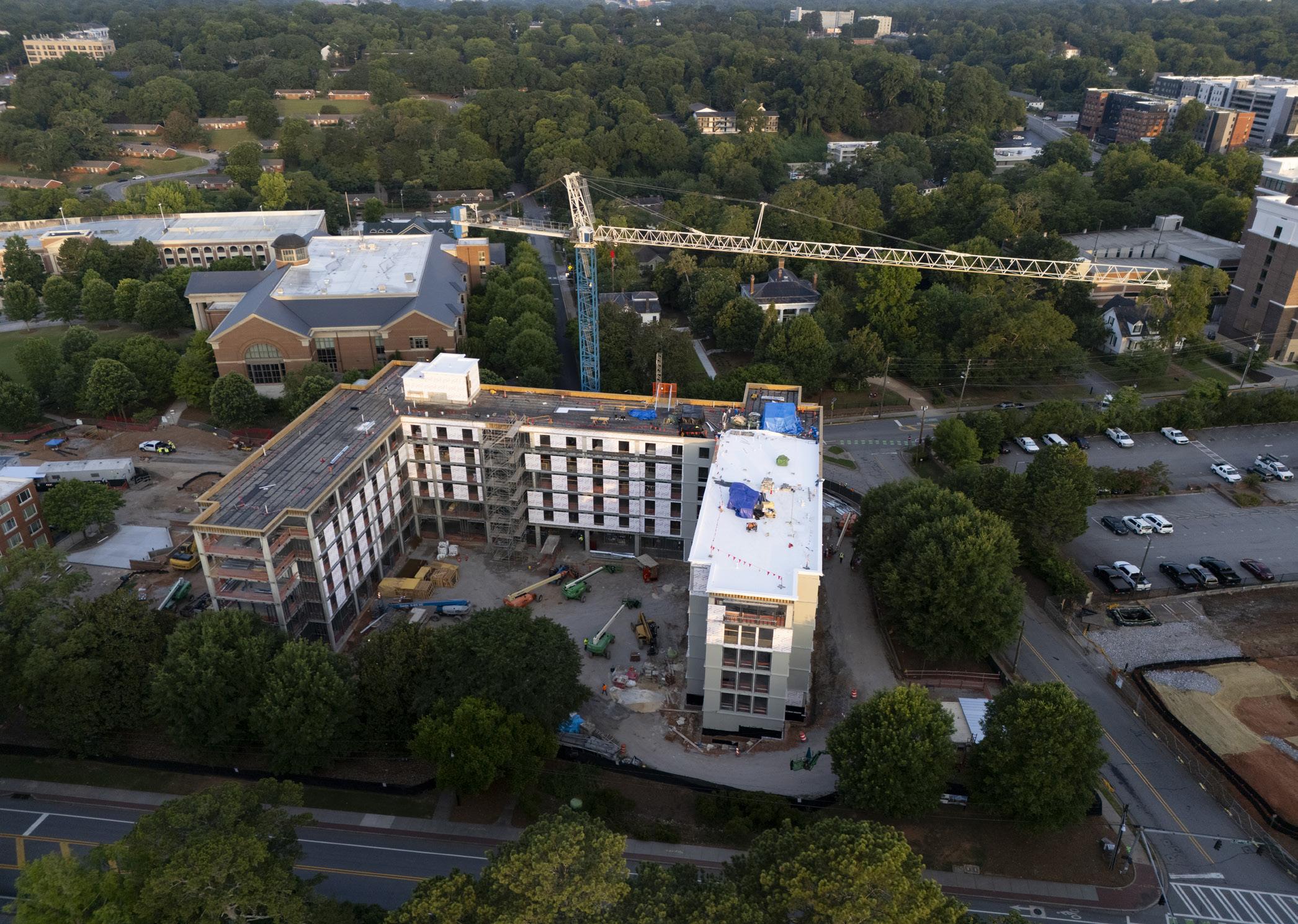
kitchen. The hall will also serve as the new home for the Launch Pad, UGA’s entrepreneurial living and learning community currently housed in Creswell Hall.
With modern amenities, thoughtfully designed community spaces and close proximity to academic and dining facilities, the residence hall is intended to foster a strong sense of belonging and support student engagement and success.
Following the successful completion of Phase I in 2024, the university is advancing its Science and Ag Hill Modernization initiative with Phases II and III. These efforts are focused on expanding research capacity and creating interdisciplinary learning environments to support scientific advancement.
Phase II centers on the renovation of a wing of the Cedar Street Building B, formerly known as the Biological Sciences
Building. Expected to be completed by spring 2026, the updated facility will house the Department of Environmental Health Sciences along with select research groups from the Odum School of Ecology and the departments of genetics, cellular biology, microbiology, entomology and crop and soil sciences. Phase III, now underway, is scheduled to open in January 2027 in Cedar Street Building A. This phase includes the construction of a new instructional hub in the south wing of the former Poultry Sciences Building, while the north wing will have space for the Institute of Integrated Precision Agriculture. Together, these enhancements will strengthen interdisciplinary teaching and research across critical scientific fields.
By modernizing these facilities, UGA is expanding lab and learning spaces, fostering collaboration across academic disciplines and supporting continued growth in STEM education and research.
The University of Georgia continues to make strategic investments in infrastructure to strengthen campus systems and mitigate the impact of power outages on teaching, research and student life. Through new construction projects, utility upgrades and long-term planning, these efforts aim to improve reliability and safeguard essential operations.
“No campus is immune to system disruptions, and while we will continue to do everything reasonably possible to prevent them from happening, our goal is to reduce their impact when they do happen,” said Ryan Nesbit, vice president for finance and administration. “We’re focused on building infrastructure that’s dependable under pressure and investing across multiple areas to support a strong, stable university environment.”
A key focus area has been ensuring that new and renovated facilities are built with resilience in mind. Several recently completed or ongoing projects — such as the I-STEM Research Buildings, Science and Ag Hill Modernization Phases I and II, and the new School of Medicine Building — include natural gas generators designed to provide immediate emergency power in the event of an outage.
Similar planning is underway for student-focused facilities. The West Campus Dining, Learning, and Well-being Center, set to open in fall 2026, will have generator support to enable scaled-down dining operations during outages. Auxiliary Services is also exploring funding options for a generator at the Joe Frank Harris Dining Commons to help ensure consistent access to food services.
To further support research continuity, the university is investing approximately $500,000 in Uninterruptible Power Supply (UPS) systems to protect sensitive equipment from brief but potentially damaging power fluctuations. These systems are being installed in high-impact research areas such as the Center for Applied Isotope Studies and the Complex Carbohydrate Research Center, which together house more than $100 million in equipment. Unlike traditional generators, UPS systems provide instant, battery-based backup that keeps
equipment stable during brief interruptions, helping to preserve data integrity and operational continuity.
The Facilities Management Division is working with Georgia Power to modernize the university’s main electrical substation, which serves as the central power hub for the Athens campus. As part of a three-phase plan, FMD is purchasing a new transformer to expand capacity and improve load balancing. Other improvements include replacing aging electrical components and upgrading the substation’s physical security.
Part of those upgrades include expanding wildlife deterrents and surveillance measures with support from specialists in the Warnell School of Forestry and Natural Resources and the College of Veterinary Medicine. While the substation already has extensive protections against animal interference, wildliferelated disruptions cannot be entirely eliminated. These added measures aim to further reduce the risk of future incidents and strengthen overall system reliability.
Enterprise Information Technology Services is also leading efforts to reinforce the university’s digital environment.
“As the demands on campus systems grow, so does the need for infrastructure that can handle them,” said Tim Chester, vice president for information technology.“We’re increasing capacity and improving reliability so the university can continue to operate at a high level without straining the technology behind it.”
Improvements are underway at the Boyd Data Center, which supports UGA’s core digital services, including network infrastructure, instructional technologies and administrative systems. In 2024, EITS upgraded the data center’s two primary backup power systems to higher-capacity models. Future improvements include installing new electrical panels and HVAC components to meet increasing power demands and maintain proper conditions for sensitive equipment.
Network reliability is also being strengthened across campus through a multi-year initiative to replace outdated fiber optic cabling and upgrade more than 180 building edge routers.
These changes will expand bandwidth and improve the speed and reliability of internet access in classrooms, labs, and offices.
Looking ahead, EITS is evaluating plans for a new green field data center.This facility would help consolidate existing IT infrastructure into a more modern and energy-efficient space, with increased electrical capacity to meet future campus needs. Together, these projects are strengthening the systems that support the university community, from energy reliability to digital connectivity. Each improvement is part of a broader, forward-looking effort to stay ahead of demand and ensure dependable operations.
from page 1
accreditation, admissions, curriculum, assessment, student affairs, faculty development, academic enrichment and continuous quality improvement.
In addition, Yana Zavros — a leading gastric cancer researcher and former professor of cellular and molecular medicine at the University of Arizona’s College of Medicine in Tucson — was named UGA’s inaugural Georgia Research Alliance Eminent Scholar in Molecular Medicine. Zavros’ work has already led to a targeted therapy for pancreatic cancer that is now in Phase 2 clinical trials. Zavros is currently recruiting for two positions on her UGA research team: a translational pathologist and a biomedical scientist — additions that will further enhance the new school’s research enterprise.
EDITOR’S NOTE: COLUMNS WILL NOT BE PRINTED THIS ACADEMIC YEAR, WITH THE EXCEPTION OF A FEW SPECIAL EDITIONS SUCH AS THIS ONE. TO RECEIVE THE DIGITAL VERSION, EMAIL COLUMNS@UGA.EDU
shopping for textbooks, spirit gear and other essentials better than ever.
Increased parking availability
A new parking deck, known as West Campus Parking Deck II (Lot W18), is adding nearly 1,100 parking spaces. The parking deck sits next to West Campus Deck (Lot W09) and Brumby Hall. West Campus Parking Deck II will primarily serve students living in nearby Brumby Hall, Russell Hall, Creswell Hall, Black-Diallo-Miller Hall and other residence halls.
College Station Park-and-Ride (Lot E23) has grown by nearly 650 spaces. UGA campus members will benefit from increased bus service to both park-and-ride lots — College Station Park-and-Ride (Lot E23) and East Side Park-and-Ride (Lot E26) — this fall.
The parking lot adjacent to Joe Frank Harris Commons near the Ramsey Student Center (Lot E09) has added 70 spaces.

New bus routes and route names
New bus routes and route names will take effect Aug. 11. Transportation and Parking Services (TPS) and Student Government Association (SGA) leaders proposed the new routes to increase access to campus and improve efficiency. TPS solicited input from the public on the proposed changes from June 6-22 and incorporated the suggestions provided to further improve the new routes.
ter match bus capacity with route volume. The only bus stop eliminated was the stop at Clarke Central High School, based on lack of usage. New route names have been created to match the new routes and increase naming consistency in the UGA transit system.
New retail dining options
pany founded by UGA alumnus Drew French, is opening a new location in Bulldog Café at the Tate Student Center. Your Pie will occupy the former location of Niche Pizza Co. and will use a hearth oven to create personal-sized, custom pizzas for guests.
Also at Bulldog Café, Chick-fil-A has expanded its offerings, transitioning from an express location to a full-menu store.
Dunkin’, Newk’s Eatery, Your Pie and Chickfil-A will use their proprietary apps for mobile ordering at their UGA locations. Chick-fil-A also will use the Transact app for students who want to pay with Paw Points.
converted the Market at Tate to a checkoutfree location as well.
Both markets incorporate AiFi (rhymes with WiFi) technology that uses a camera-based spatial intelligence system to allow customers to use their credit card or Paw Points to buy what they want without checking out at a cashier.
A request from the SGA to extend the operating hours of the Market at Tate inspired the conversion.
“SGA is incredibly grateful for Auxiliary’s continued commitment to responding to student concerns, especially around a topic as sensitive as food availability,” said SGA President John Neely. “We initially reached out about the Tate market’s limited hours, which closed before many student organization meetings wrapped up. While our goal was to extend the closing time, Auxiliary went above and beyond.”
UGA bus riders can expect to benefit from enhanced service to core campus destinations and to park-and-ride lots around the periphery
Among the new retail dining options coming to campus is Blenz Bowls, a purveyor of fruit smoothie bowls and drinks. Blenz Bowls will occupy The Creamery.
Autonomous market at Tate Center
from page 1
the highest employment rates for graduating students in its history.
Stacy Jones
Stacy Jones has been named vice president for public service and outreach at the Jones previously served as PSO’s associate vice president and director of the UGA Center for Continuing Education & Hotel. She began her new role on
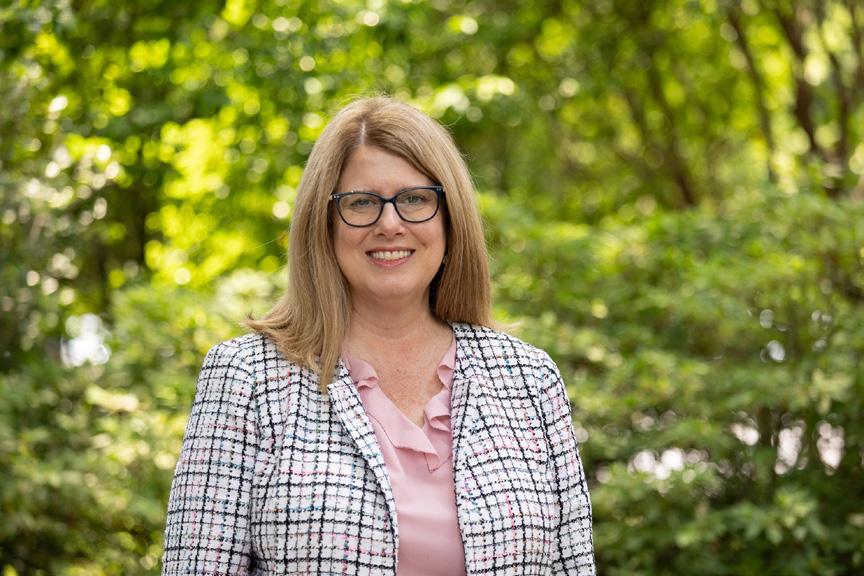
Reporting to the senior vice president for academic affairs and provost, Jones will also serve as a member of the University Cabinet.
As vice president for public service and outreach, Jones will serve as a champion for the university’s public service mission and lead eight PSO units: Archway Partner ship, Carl Vinson Institute of Government,
DONORS
Dunkin’ and Newk’s Eatery are opening in the Rothenberger Café in Amos Hall.
J.W. Fanning Institute for Leadership Development, Marine Extension and Georgia Sea Grant, Office of Service-Learning, Small Business Development Center, State Botanical Garden of Georgia and the UGA Center for Continuing Education & Hotel. Jones succeeds Jennifer Frum, who retired Dec. 1, 2024, following a distinguished 30-year career at UGA.
Alex Orso
Alessandro “Alex” Orso was appointed dean of the College of Engineering, effective July 1.

As dean, Orso will lead the UGA College of Engineering’s academic, research and outreach programs. Founded in 2012, the college is home to 120 faculty and 3,000 undergraduate and graduate students.
The college includes four schools: the School
Building on the success of the autonomous market at Russell Hall, Dining Services has
of Chemical, Materials and Biomedical Engineering; the School of Computing; the School of Electrical and Computer Engineering; and the School of Environmental, Civil, Agricultural and Mechanical Engineering.The School of Computing is jointly administered by the College of Engineering and the Franklin College of Arts and Sciences.
Orso previously served as a professor in the College of Computing at the Georgia Institute of Technology and as director of Georgia Tech’s Scientific Software Engineering Center. Prior to that, he served as associate dean for off-campus and special initiatives in the College of Computing at Georgia Tech from 2020 to 2025 and was interim dean of the college during the 2023-2024 academic year.
Santanu Chatterjee
Santanu Chatterjee, a professor and associate dean for graduate programs in the C. Herman and Mary Virginia Terry College of Business at the University of Georgia, has been named interim dean of the college.
Chatterjee, the Harold A. Black
CLR from page 1 from page 1
these results, we are most driven by the lives we enhance and the doors we open with the funding entrusted to the UGA Foundation by our generous donors.”
The School of Medicine achieved several milestones since it was authorized to proceed in February 2024.The $100 million needed for the Medical Education and Research Building was secured through a combination of state funding and private support less than a year after its announcement. The state-of-the-art facility will feature medical simulation suites, biomedical laboratories and classrooms to support Georgia’s growing health care needs.
Scholarship support open doors
Last November, UGA established its 1,000th endowed, need-based scholarship for undergraduate students. Many of these scholarships cover the general cost of attendance, but others support experiential learning, student veterans, first-generation students and more.
Donor
Numerous collective efforts led to significant contributions to UGA in FY25, including:
• The UGA Parents Leadership Council raised $1.5 million for funds and initiatives that enhance the undergraduate student experience.
• The Class of 2025 set a Senior Signature record; more than 3,400 students donated over $115,000 to 544 funds across campus.
• The fourth annual Dawg Day of Giving brought in more than 13,000 gifts to support students and programs, a single-day record for the university.
Private giving in FY25 extended to all areas of campus. Naming events to recognize seven- and eight-figure gifts to the university took place, including the C. Herman Terry Risk Management and Insurance Program, the Benson-Bertsch Center for International Trade and Security, Layton Design Studio, and the M. Douglas and V. Kay Ivester Institute for Business Analytics and Insights.
The Delta Air Lines Foundation committed $5 million to the Hospitality and Food Industry Management program to expand hands-on learning opportunities for students by launching the renovation of the UGA Center for Continuing Education & Hotel, a Public Service and Outreach facility, to include teaching space for event management, culinary arts and hotel operations.
clearer story of their strengths, preparing them to stand out and succeed beyond graduation,” said Marisa Anne Pagnattaro, vice president for instruction and senior vice provost for academic planning.
UGA is among the first universities in the nation to implement the CLR on a campuswide scale.The launch began this summer when all 6,000 incoming first-year students were introduced to the CLR during orientation, and this fall the tool will be available to all of UGA’s 40,000 undergraduate and graduate students.
The CLR is built around UGA’s six new Institutional Competencies:
• Critical Thinking
• Analytical Thinking
• Communication
• Social Awareness & Responsibility
• Creativity & Innovation
• Leadership & Collaboration
UGA is leading the way as the first university to implement a CLR on such a large scale. Thanks to extensive collaboration across campus, every validated course and activity in the CLR is mapped to at least one of the six competencies.This gives employers and graduate schools confidence that a student’s skills, such as leadership or critical thinking, are not
The UGA Bookstore recently finished a major remodel to modernize its look and enhance the Georgia Bulldog experience. Students will benefit from revamped areas for textbooks, technology and dorm essentials. Bulldog fans will enjoy a dedicated game day shop, a special Uga-themed area and a greater selection of premium apparel. The upgrades also include sleek new fixtures, marble flooring and dynamic wall features. The remodel was made possible by the bookstore’s business partner, Follett Higher Education.
A ribbon cutting will take place at the bookstore Aug. 22 at 9 a.m. It is open to the public, and the bookstore will be open. PARKING from page 1
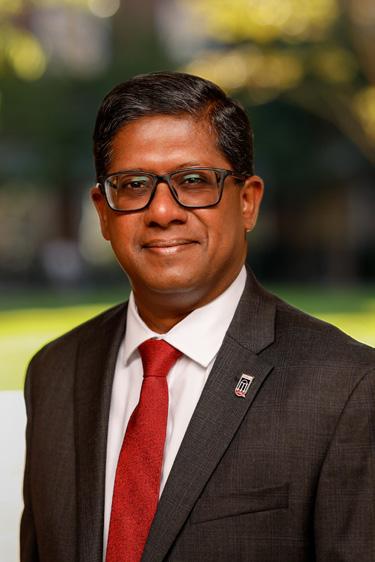
Distinguished Professor of Economics, also serves as director of both the full-time MBA and the Master of Science in Business Analytics programs in the Terry College. He began his tenure as interim dean on June 30. Terry’s full-time MBA program has achieved international recognition since Chatterjee was named director in 2014. The program was ranked the No. 1 value for the money globally by the Financial Times in both 2024 and 2025. In separate rankings, the program placed No. 11 among public business schools and No. 29 overall in the 2025 U.S. News & World Report survey. This marked the eighth consecutive year the survey has ranked the UGA MBA among the top 20 full-time programs at public universities. Chatterjee was promoted to associate dean in 2021, with a focus on graduate program enhancement and growth.
just self-reported but backed by experience. The foundational work on the institutional competencies is faculty driven. Instructors are aligning their course learning outcomes with UGA’s competencies so that, beginning this fall, students will be able to see which competencies are tied to each course and activity and search for classes by the skills they want to build.